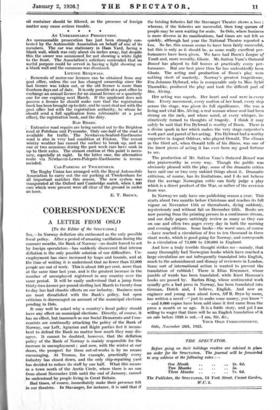CORRESPONDENCE
A LETTER FROM OSLO
[To the Editor of the SrEcTAT0n.1 Sta,—In Norway deflation sits enthroned as the only possible fiscal policy. After a period of amazing vacillation during the summer months, the Bank of Norway—no doubt forced to act by foreign speculators—has suddenly discovered that intense deflation is the only possible solution of our difficulties. Un- employment has since increased by leaps and bounds, and at the time of writing it is understood that no fewer than 25,000 people are out of work. This is about 100 per cent. more than at the same time last year, and is the greatest increase in the number of unemployed registered in any country over the same period. It will be easily understood that a jump from thirty-two kroner per pound sterling last March to twenty-four to-day has had chaotic effects on our industry. Business men are most dissatisfied with the Bank's policy, but open criticism is discouraged on account of the municipal elections pending in Oslo.
It may well be asked why a country's fiscal policy should have any effect on municipal elections. Directly, of course, it has no effect, but inasmuch as our Social Democrats and Com- munists are continually attacking the policy of the Rank of Norway, our Left, Agrarian and Right parties feel it incum- bent to defend the Bank no matter how much they may dis agree. It cannot be doubted, however, that the deflation policy of the Bank of Norway is mainly responsible for the increase in unemployment ; and now, with the winter at our doors, the prospect for these out-of-works is by no means encouraging. At Tromso, for example, practically every industry has closed down, and the only ship-repairing yard has decided to reduce its staff by one half. What this means in a town north of the Arctic Circle, where there is no sun from about November 25th until the end of January, cannot be understood by people living in Great Britain.
Bad times, of course, immediately make their presence felt in our theatres. In Stavanger, for instance, it is said that if the brisling fisheries fail the Stavanger Theatre shows a loss ; whereas, if the fisheries are successful, then long queues of people may be seen waiting for seats. la Oslo, where business is more diverse in its ramifications, bad times are not felt so quickly, although last year the National Theatre reported a loss. So far, this season seems to have been fairly successful, but this is only as it should be, as some really excellent per- formances have been given. We have had /bsen's League of Youth and, more recently, Ghosts. Mr. Sutton Vane's Outward Bound has played to full houses at practically every per- formance. But our best piece thus far has undoubtedly been Ghosts. The acting and production of Ibsen's play were nothing short of masterly. Norway's greatest tragedienne, Fru Johanne Dybwad, who is comparable only to Miss Sybil Thorndike, produced the play and took the difficult part of Mrs. Alving.
Her acting was superb. Her heart and soul were in every line. Every movement, every motion of her head, every step across the stage, was given its full significance. She was a living and vital Mrs. Alving, a real woman whose soul had been strung on the rack, and whose mind, at every whisper, in- stinctively turned to thoughts of tragedy. I think it may safely be said that Fru Dybwad is worthy of Ibsen. There is a divine spark in her which makes the very stage carpenter's work part and parcel of her acting. Fru Dybwad had a worthy supporter in August Oddvar, who played Oswald. The climax in the third act, when Oswald tells of his illness, was one of the finest pieces of acting it has ever been my good fortune to see.
The production of Mr. Sutton Vane's Outward Bound was also praiseworthy in every way. Though the public was obviously pleased with the play, some of the dramatic critics have said one or two very unkind things about it. Dramatic criticism, of course, has its limitations, and I do not believe that the average Norwegian critic can fairly judge a play which is a direct product of the War, or rather of the aversion from war.
In Norway we only have one publishing season a year. This starts about two months before Christmas and reaches its full vigour on November 15th or thereabouts, dying suddenly, mysteriously and without fail on December 24th. Books are now pouring from the printing presses in a continuous stream, and our daily papers untiringly review as many as they can on one and often two pages every day in both the morning and evening editions. Some books—the worst ones, of course —have reached a circulation of five to ten thousand in three short weeks, which is good going for Norway, and corresponds to a circulation of '75,000 to 150,000 in England.
And here a truly terrible thought strikes me—namely, that many thoroughly bad Norwegian books which have reached a large circulation are not infrequently translated into English, much to the astonishment and dismay of reviewers in London. Some sort of international action is wanted to prevent tUe translation of rubbish ! There is Elias Knemmer, whose jumble of words has been translated, while Knot Hamsun's books are passed by. Barbra Ring, whose sentimental work usually gets a bad press in Norway, has been translated into German, Dutch and, I believe, English. And now an engineer and young man about town, Alf B. Bryn by name, has written a novel—" just to make some money, you know —and 8,000 copies have been sold since it first came from the press a month or so ago. It is a futile story, and yet I am willing to wager that there will be an English translation of it on sale before 1926 is out.—! am, Sir, &c.,










































 Previous page
Previous page